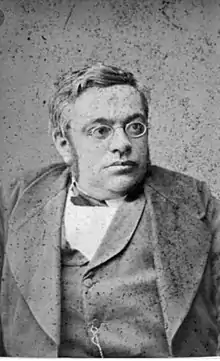Wilhelm Mannhardt | |
|---|---|
 | |
| Born | 26 March 1831 |
| Died | 25 December 1880 (aged 49) |
| Nationality | German |
| Academic background | |
| Alma mater | |
| Academic advisors | Jakob Grimm |
| Academic work | |
| Discipline | Germanic studies |
| Main interests | |
Wilhelm Mannhardt (March 26, 1831, Friedrichstadt – December 25, 1880, Danzig) was a German mythologist and folklorist. He is known for his work on Germanic mythology, on Baltic mythology, and other pre-Christian European pantheons; and for his championing of the solar theory, namely in the early years of his career, under the influence of Jakob Grimm. Later on, Mannhardt focused more on vegetation spirits from an evolutionist point of view, namely the primitive tree cult and its later developments.[1]
Works
- De nominibus germanorum propriis quae ad regnum referuntur observationis specimen (1857)
- Germanische Mythen: Forschungen (1858)
- Die Götterwelt der deutschen und nordischen Völker (1860)
- Roggenwolf und Roggenhund (1865)
- Die Korndämonen (1868)
- Letto-Preussische Götterlehre (1870)
- Wald- und Feldkulte. Band 1: Der Baumkultus der Germanen und ihrer Nachbarstämme: mythologische Untersuchungen (1875 - reprint)
- Wald- und Feldkulte. Band 2: Antike Wald- und Feldkulte aus nordeuropäischer Überlieferung erläutert (1877 - reprint)
- Klytia (1875)
- Gedichte. Mit einer Lebenskizze des Dichters. [Edited by L. and G. Mannhardt.] (1881)
- Mythologische Forschungen (1884)
References
- ↑ Rosa, Frederico Delgado, 2018. « Avant Le Rameau d’Or : biographie de Wilhelm Mannhardt, précurseur oublié de James Frazer » in Bérose, Encyclopédie en ligne sur l’histoire de l’anthropologie et des savoirs ethnographiques, Paris, IIAC-LAHIC, UMR 8177.
External links
This article is issued from Wikipedia. The text is licensed under Creative Commons - Attribution - Sharealike. Additional terms may apply for the media files.